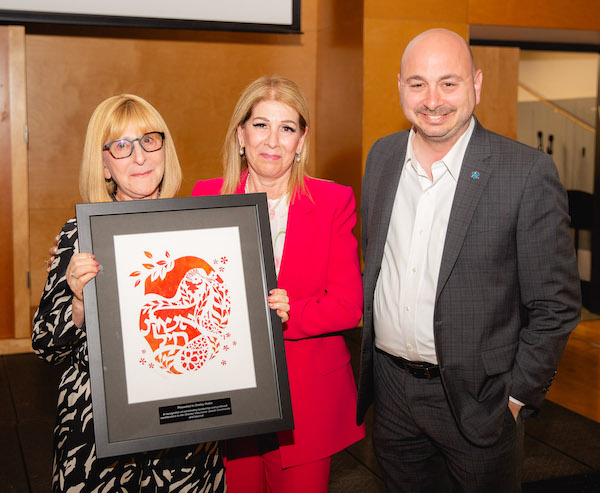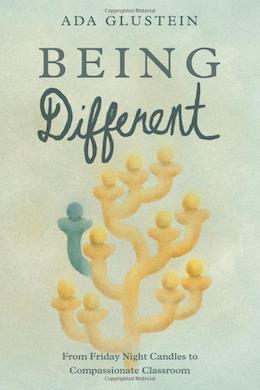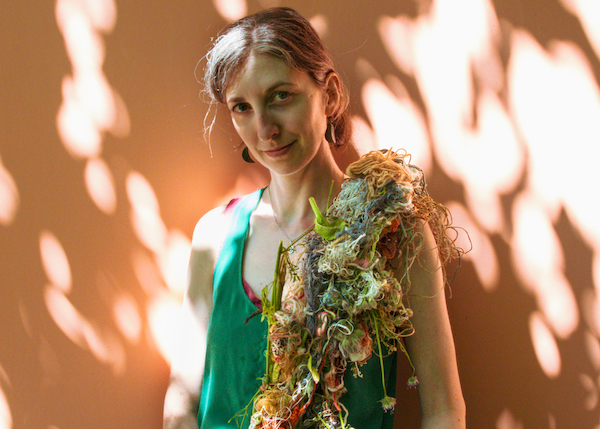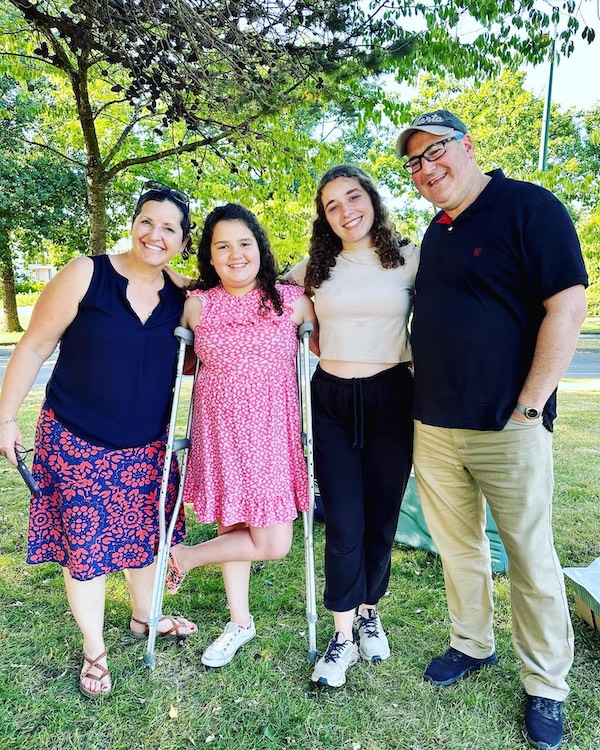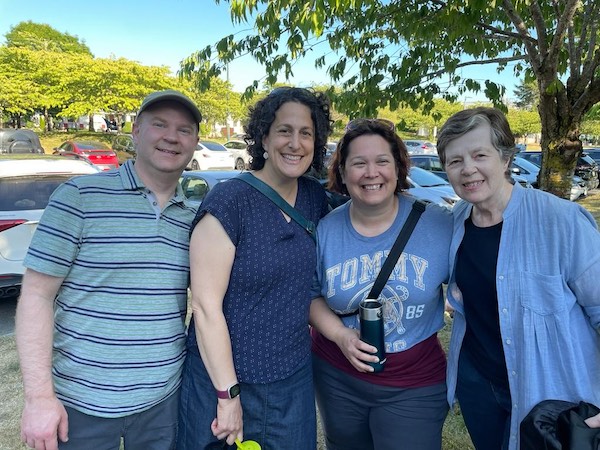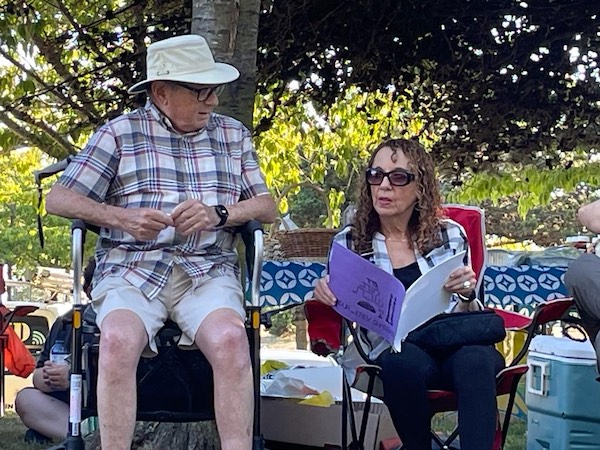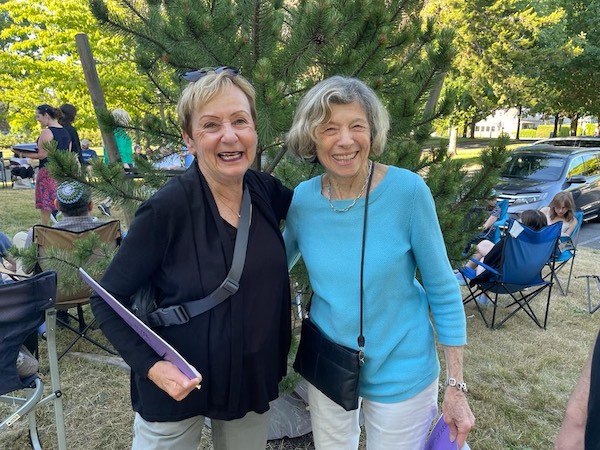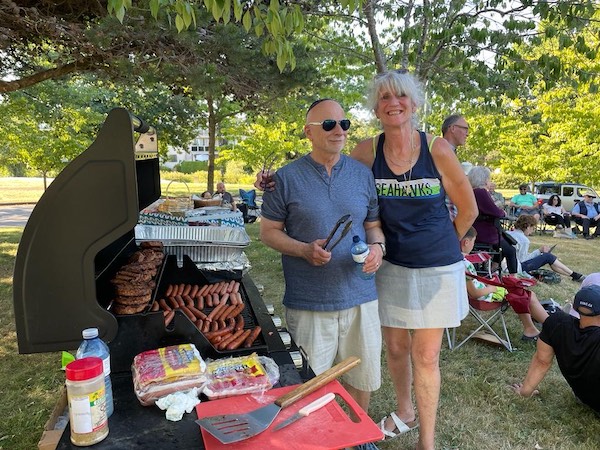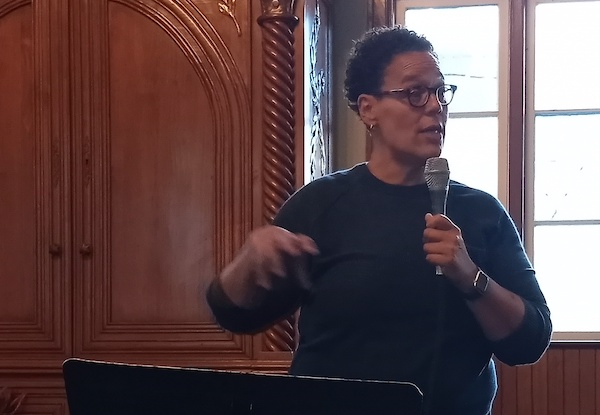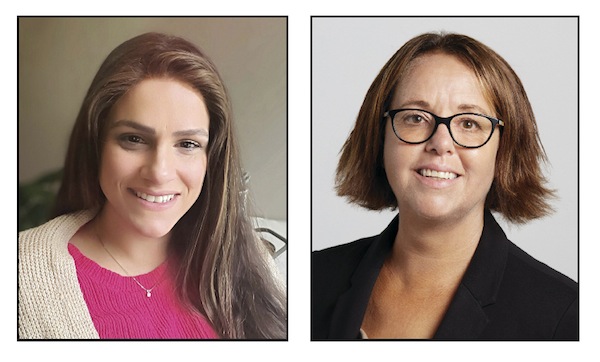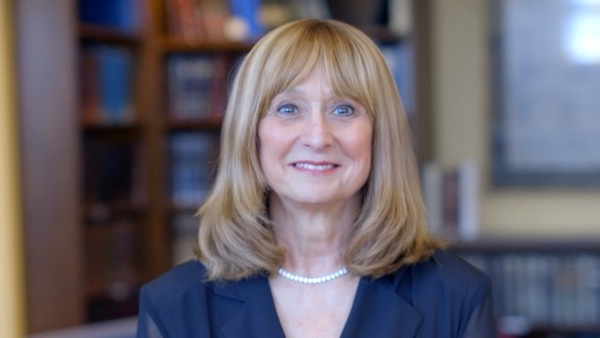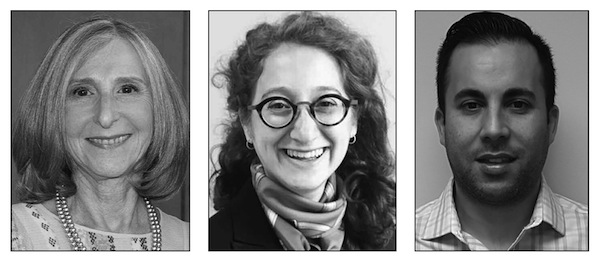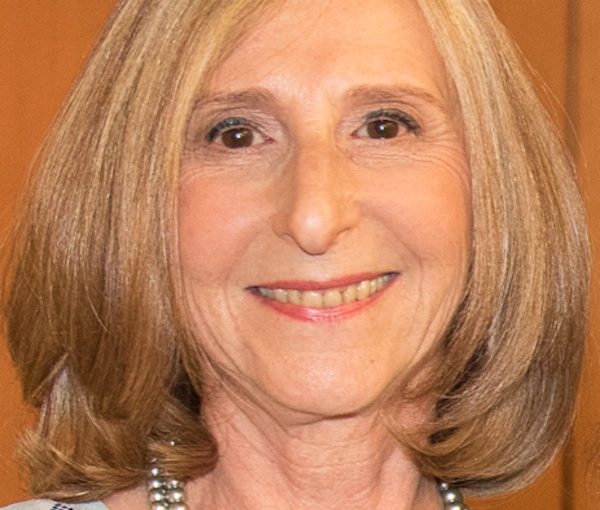Jews of Colour Initiative chief executive officer Ilana Kaufman speaks at Or Shalom on June 6. (photo by Cynthia Ramsay)
On June 6 at Or Shalom, Jews of Colour Initiative chief executive officer Ilana Kaufman spoke about Beyond the Count: Perspectives and Lived Experiences of Jews of Colour. She said JoCI commissioned the survey to find out how many Jews of Colour there are in the United States, “what are our experiences, what are our perspectives, what are our beliefs, and then, how do you parlay that information into making the Jewish community, quite frankly, less racist, more inclusive.”
Kaufman was in Vancouver from Berkeley, Calif., where she is based, to share the survey results with “congregational rabbis, agency professionals, educators, board members, Jewish Federation staff, community members of colour and allies,” said Shelley Rivkin, vice-president of local and global engagement at the Jewish Federation of Greater Vancouver, which organized and funded the series of meetings. “Jewish Federation had been in conversation with Ilana about the work of the JoCI for over a year,” she said.
Or Shalom’s Rabbi Hannah Dresner introduced Kaufman at the shul talk, and Kaufman dove into the data.
“Depending on the age range you’re thinking about … between eight to 20% of the U.S. Jewish community are community of colour,” with the higher numbers being in the younger age groups, she said. “Every day in the U.S., the number of Jews of Colour is increasing, not decreasing. In terms of the data for multiracial families … 20% of U.S. Jewish families identify as multiracial. You may not see the family members of colour, but we’re there. And, if you’re on the coast, that number goes up to 25%, or one in four families. And that number, of course, is getting bigger every day, too.”
Kaufman is working with colleagues to figure out how many Jews of Colour there will be about 20 years from now. By 2042 or 2043, she said, “depending on immigration patterns, the U.S. will become half People of Colour. The majority of those folks will be multiracial and, in the U.S. Jewish community, we don’t know the date [that will happen], but those patterns map onto the U.S. Jewish community as well.”
While Beyond the Count is not a truly representative survey, as that would have cost about a million dollars, which was beyond JoCI’s capacity, the organization “cast the net as far as we could from the Jews of Colour Initiative perch,” said Kaufman. “We were able to have 1,118 qualified survey respondents in our study. It’s the largest dataset of Jews of Colour in the U.S., maybe anywhere in the world, and it’s not representative at all.” The interviewees over-represented in many areas, such as level of education attained and engagement in Jewish activities.
Regarding the methodology, Kaufman said the survey “is unapologetically framed with Critical Race Theory.”
“From our perspective,” she said, “we can’t do this work without framing it in a context where racism is real, and the effects of racism are real. And it doesn’t implicate white people, it doesn’t marginalize People of Colour, it just reveals the infrastructural truth that allows us then to leverage that truth to make change.”
Feminist pedagogy also informed the work, said Kaufman, and “we used a counter-storytelling approach, which means, instead of white folks saying, People of Colour, tell me your story … we had Jews of Colour, our community, centre the conversation and the work to create shape around that.”
JoCI doesn’t define the term “Jews of Colour,” both because race is a social construct and because identity “has to be owned and carried by the self and so we don’t want to be in the business of telling people how to self-identify,” said Kaufman. The organization uses “Jews of Colour” as an admittedly imperfect conceptual framework, she said, pointing out that, while race may be a fiction, racialization is real, and JoCI operates from that space. For those who self-identify as Jews of Colour, JoCI wants to be a space for resources and support.
Kaufman spoke about “whiteness,” also a social construct. Citing historian Karen Brodkin, Kaufman said the G.I. Bill – which offered home loans, college loans and other benefits to veterans after the Second World War – was one of the moments “when European Jews became white.” Instead of rejecting the benefits until their “black and brown family members in uniform” were offered the same opportunities, “there were moments of passive acceptance of the tools of upward mobility that were offered to Jews of European background that were not offered to People of Colour in the United States at that time,” said Kaufman. “And that’s one of the ways that Jews moved into whiteness, from being a highly ethnicized people in the United States.”
But it is a conditional whiteness, she said, and Jews who had lived with a passive acceptance of privilege had that comfort destroyed in 2016 with Charlottesville, “when white supremacists and neo-Nazis reminded Jews who had enjoyed the benefits of whiteness that they’re not safe…. And, in fact, that white identity is not seen as white in the eyes of white supremacists and neo-Nazis.”
Kaufman said one of the ways we can have a more dynamic and thoughtful conversation is to recognize the extent to which racism harms white people. “Even the concept of whiteness is such a flattened idea of who we’re talking about,” she said. “And so, when you think about Jewish ethnicity and you think just about Jewish European ethnicity, it is vast and it is diverse and, at least in the United States, it’s been boiled down to bagels … this caricature of who the Jewish people are.” When we celebrate diversity and grapple with intercultural dynamics, she said, “white folks have a stake in the conversation that’s not about being the target of opposition, but a collaborative part of the conversation” and, to do that, “we certainly have to recognize the privilege that comes with whiteness or being perceived as white…. When we get past our understanding of privilege, we need to get into who we are as ethnic, racial beings, and everybody has an equal stake in that conversation,” she said.
Almost half of survey respondents (45%) selected two or more racial categories. “And that’s the fastest growing population of People of Colour in the U.S., multiracial people, and that also maps onto the Jewish community,” said Kaufman.
One finding of the survey was that most JoCs feel more comfortable in an environment that’s multiracial. “Jews of Colour feel a tremendous amount of stress when [they’re] the only one in a situation…. We have to help people feel welcome without [them] feeling like we’re singling them out,” she said.
Respondents participated in a wide variety of Jewish activities and organizations, including formal Jewish education, attending synagogue, being part of a Jewish youth group and traveling to Israel: 63% of respondents participated in two or more Jewish activities. Yet most JoCs report having had a range of negative experiences in Jewish communal settings. At the top, 75% of respondents agreed or strongly agreed with the statement, “Others have made assumptions about me based on my skin tone,” and 74% with the statement, “I have felt burdened with explaining myself/my identity.” At the lower end, 60% agreed or strongly agreed that “I have felt tokenized” and 58% that “I have been treated as if I don’t belong.”
“A tip on that,” said Kaufman. “Of course, we want to welcome Jews of Colour into our committees to do things that matter…. If we’re reaching for someone because of what we think they look like, we have to stop ourselves. We just have say, we’d love to have you on our committee, but we want to know what you want to be on our committee for, instead of telling them … what we want them on our committee for.”
As an example, when she was asked to be on board, she made it a condition that she not have to talk about diversity. “And so,” she said, “how do you bring people in for why they want to be there, what they’re good at, how they want to grow? You just ask, how do you want to grow professionally, personally? Maybe I can give you that community opportunity if you join us, which is way better than saying, I don’t know you, I don’t know what you like, but I want you on my committee because of how I think you look.”
Overwhelmingly, survey respondents did not feel that American Jewish leaders are adequately addressing “the specific needs of members/participants who are Jews of Colour,” “the need for greater racial/ethnic diversity in Jewish organizational leadership” or “racism/white supremacy within the American Jewish community.” The numbers improve with regards to how these leaders are addressing “racism/white supremacy outside of the American Jewish community.”
“There’s deep comfort in helping those people outside,” said Kaufman. “What happens when those people are in all of us? And how do we collectively adopt a ‘those people’ identity so that we can actually dissolve this barrier between us and them?”
The study focused on racism, not antisemitism, said Kaufman. “Historically, when the U.S. has talked about antisemitism, they haven’t been including Jews of Colour in that conversation. And so, generally, when you hear about who’s being supported by the organizations fighting antisemitism in the U.S., you never see Jews of Colour included in that conversation.”
JoCI has had to be very careful, she said, so that the survey doesn’t become a tool to fight antisemitism among People of Colour. “The Jewish community and our colleague organizations who deal with antisemitism in the U.S. often use a dynamic of anti-Black racism to create support to fight antisemitism, and this has split People of Colour from Jewish people who [are] white.” She talked about the importance of taking on white supremacy. “Inside of white supremacy is both racism and antisemitism,” she said. “And I think it’s incumbent upon the U.S. Jewish community to look at racism and antisemitism side by side and, in our context, the container that holds that is white supremacy. So, I’m very interested in fighting antisemitism, I’m very interested in fighting racism and, I have to say that, in my family’s life and the lives of a million Jews of Colour in the United States, is for us to talk about white supremacy and to target racism and antisemitism in the same breath, at the same time. Because the piece is, we need to be in a relationship with our Muslim brothers and sisters, our Christian brothers and sisters, our family members all in between, because we’re all under threat from the white supremacists…. I’m very interested in fighting antisemitism but I’m not interested in fighting antisemitism if it only means we’re fighting for white, Jewish people.”
Beyond the Count makes four recommendations: support organizations and initiatives led by and serving Jews of Colour; shift organizational leadership to more accurately reflect the diversity of American Jews; prioritize creating spaces and places for discourse and dialogue with and among Jews of Colour; and promote further research by and about Jews of Colour.
Kaufman “helped us better understand the nuances and diversity of the JoC community and how systems of inequality are perpetuated in our own community,” said Rivkin in an email to the Independent. “The issues identified in Beyond the Count must be taken seriously, we can’t offer token solutions. We have to be intentional and first engage Jews of Colour to find out what they see as the key priorities and what path should be taken going forward.”
To do that, Rivkin said, “A key role of Jewish Federation is to bring stakeholders from across the community together to address critical issues and facilitate discussions…. One of our next steps is to explore the feasibility of conducting either a B.C. or Canada wide survey to gain a better understanding of the local JoC perspective.”
To read the full text of Beyond the Count, visit jewsofcolorinitiative.org.

